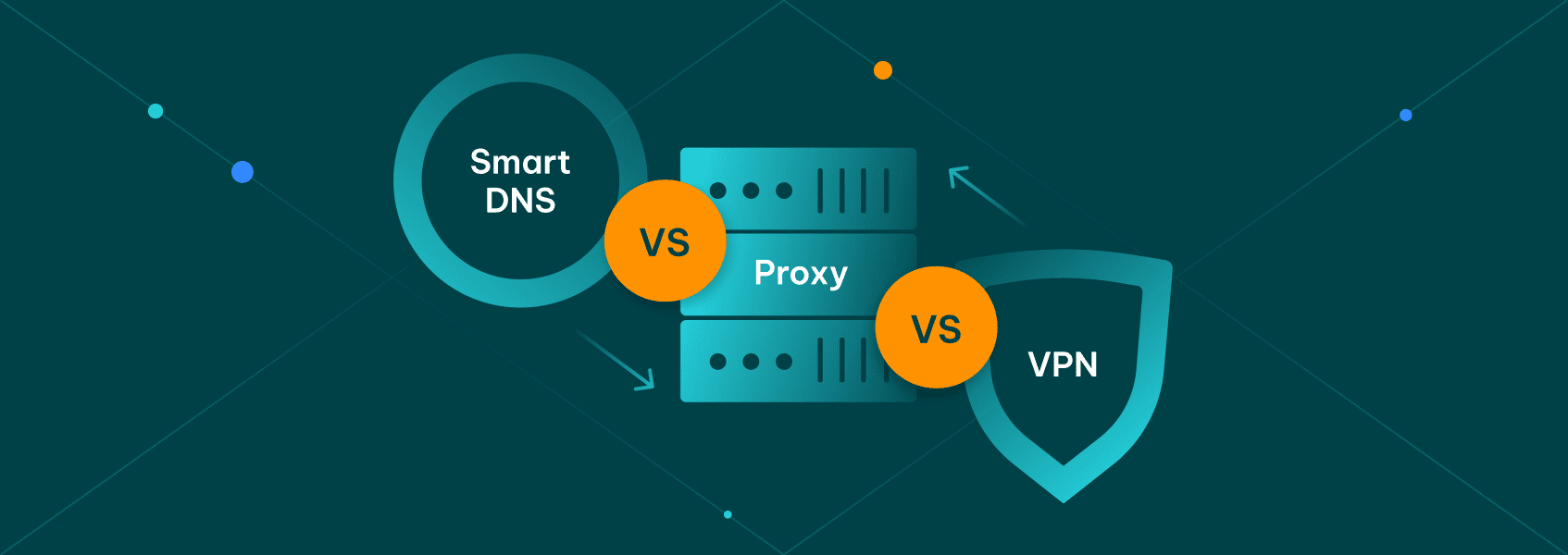SmartDNS Vs. Proxy Vs. VPN – Which Should You Use?


Milena Popova
In This Article
- What Are the Key Differences Between SmartDNS, Proxy, and VPN Services?
- How Does SmartDNS Enhance Your Online Streaming Experience Compared to Proxies and VPNs?
- What Are the Privacy and Security Benefits of Using a VPN Over SmartDNS or Proxies?
- Which Option (SmartDNS, Proxy, or VPN) Is More Suitable for Bypassing Geo-Restrictions?
- Can SmartDNS, Proxy, and VPN Services Be Used Simultaneously for Different Purposes?
- FAQ
By now, most internet users have encountered geographical restrictions. Whether it’s a YouTube video, a Netflix movie, or a news site, being locked out of desired content is nothing short of frustrating.
Luckily, there are three efficient ways to bypass geo-blocking. Here’s our in-depth SmartDNS Vs. Proxy Vs. VPN comparison guide to give you a full view of when to use which to avoid geo-blocking!
What Are the Key Differences Between SmartDNS, Proxy, and VPN Services?
All three technologies rely on modifying the online data flow to avoid geo-blocking, bypass censorship, and protect user’s online privacy. But they do so differently. Which one is best for your needs depends on specific circumstances. Before we dive deep into the exact use cases, here are the SmartDNS vs. Proxy vs. VPN key differences.
| Proxy Server | VPN | SmartDNS | |
|---|---|---|---|
| Bypasses geo-blocks | ✅ | ✅ | ✅ |
| IP address masking | ✅ | ✅ | ❌ |
| Requires additional software | ❌ | ✅ | ✅ |
| Encrypts traffic | ❌ | ✅ | ❌ |
| Highly customizable | ✅ | ❌ | ❌ |
| Anonymous browsing | ✅ | ✅ | ❌ |
| No-logs policy | ❌ | ✅ | ❌ |
| Decreases connection speed | ❌ | ✅ | ❌ |
| Residential IPs | ✅ | ❌ | ❌ |
Proxy servers and VPNs are primary tools to bypass geo-restrictions. Meanwhile, SmartDNS should be considered an additional option in special circumstances, but not without its merits. Proxy servers bypass restrictions by rerouting users’ online data flow through a third-party server that assigns a new IP address. You can connect to a proxy server in a different country to get a local IP address and browse all content as if you were there. Furthermore, proxies can issue an IP address coming from a genuine person, like IPRoyal’s residential proxy servers, which are nearly impossible to detect and ban.
VPNs work very similarly but apply additional encryption to the user’s traffic. Although encryption can significantly decrease the connection speed, it neutralizes online surveillance and is much better for online privacy protection. That’s why VPNs excel at bypassing censorship in countries with tight internet control , like China, Russia, or Iran. Furthermore, trustworthy VPNs have no-logs policies and don’t collect user data.
SmartDNS does not reroute the users’ traffic through an additional server, exposing the original IP address. This technology modifies DNS queries to mask the user’s geographical location. For example, Netflix sees the original IP address but also notes that DNS queries are handled in a selected region, providing access to its local content.
To summarize, proxy servers are best for accessing geographically restricted content without significantly slowing down the internet connection. However, they can be a bit risky for bypassing censorship. VPNs excel at privacy protection but can significantly decrease the connection speed, which is not good for streaming and other tasks that require low latency. Lastly, SmartDNS avoids geo-blocks without affecting the connection speed at all but does not provide any security benefits.
How Does SmartDNS Enhance Your Online Streaming Experience Compared to Proxies and VPNs?
DNS is an essential part of the internet structure that makes browsing much more comfortable. It stands for Domain Name System and is similar to a phone book, just a digital one. When you input www.amazon.com in your browser, it sends the requests to the IP address that hosts Amazon’s e-shop. But how does your browser know the exact IP address? It contacts the DNS server that says that the required IP is 54.192.189.0.
DNS servers are geographically distributed to connect the user to the closest one, but that reveals location details and limits content availability. Instead, SmartDNS uses alternative servers in different regions. It tricks websites into thinking DNS queries are resolved locally to provide previously blocked access without changing the original IP address.
Because SmartDNS does not reroute you through additional servers, it provides the best connection speed for bandwidth-intensive tasks. Simultaneously, it’s applicable only when online privacy and anonymity are irrelevant and the targeted website does not use advanced detection methods. All user’s online activities are routed through the internet service provider, so this method should not be used to bypass censorship.
What Are the Privacy and Security Benefits of Using a VPN Over SmartDNS or Proxies?
VPN stands for Virtual Private Network, and it’s a privacy protection-oriented cybersecurity software. VPN redirects the data flow from the ISP to its servers and applies additional encryption to neutralize surveillance. Recently, professional VPNs started implementing real-time online protection features, scanning traffic for viruses and other malware. This way, VPNs are taking a step closer to the antivirus industry .
It’s worth noting that proxy servers can also be customized to provide cybersecurity benefits and even do it better. VPNs aim to provide easy-to-use services for anybody, so they go easier on advanced customization options. On the other hand, tech-savvy users can customize proxies to control internet traffic according to their needs. It’s the user’s choice. Drop by our Proxy vs. VPN in-depth article to learn more about their differences.
No less important are the no-logs policies. Reliable VPNs do not collect, store, share, or sell user data. In fact, a genuine no-logs policy is what makes or breaks a VPN because those caught collecting data lose consumer trust, often resulting in a shutdown. No-logs policy is a significant VPN advantage over proxies and SmartDNS because the latter seldom implement it. We recommend choosing a VPN service that has proved the no-logs claim with at least one independent third-party audit.
Which Option (SmartDNS, Proxy, or VPN) Is More Suitable for Bypassing Geo-Restrictions?
Although it’s circumstantial, proxies are the best for bypassing geo-restrictions in most cases. Because they do not apply additional encryption, they maintain an excellent connection speed for HD streaming. Furthermore, residential proxy server traffic is nearly indistinguishable from a genuine connection, providing an outstanding geo-block evasion success rate .
On the other hand, encryption is paramount when browsing the internet in authoritarian countries . For example, accessing adult content in countries like Iran or Pakistan can get you in serious trouble if you don’t take safety precautions. A little lag is not that bad compared to hefty fines issued by the government.
SmartDNS works best for accessing restricted content when privacy and anonymity are unimportant. For example, after Europe released the General Data Protection Regulation laws (GDPR), many US-based websites became inaccessible from the EU due to different data-handling policies . However, accessing them is not illegal in both regions, and many websites have next-to-nothing detection protocols. In this case, SmartDNS is an excellent choice.
Can SmartDNS, Proxy, and VPN Services Be Used Simultaneously for Different Purposes?
Yes, many people use all three tools, depending on their needs. Furthermore, many VPN service providers have integrated SmartDNS features into their apps, allowing users to bypass geo-blocks without additional encryption from an original IP address .
It’s worth noting that IP address masking is now considered a general online safety practice. That’s why many choose proxy servers for online privacy protection that do not overburden the device with advanced encryption algorithms . More so, because there’s a variety of proxy servers, like datacenter or mobile proxies , there are more use cases compared to VPN or SmartDNS . For example, proxies are outstanding web scraping tools. Meanwhile, VPNs don’t provide the required IP rotation to target dozens of websites simultaneously, and SmartDNS does not change the IP address at all.
Overall, tech-savvy internet users can utilize all three tools simultaneously. It’s essential to remember that SmartDNS Vs. Proxy Vs. VPN comparison is not a better-or-worse case but illustrates how these different tools enhance your online browsing in different circumstances. Knowing when to use one will save you lots of trouble, especially in regions with tight internet control.
FAQ
Does SmartDNS offer the same level of privacy protection as VPNs?
No, SmartDNS does not obfuscate the original IP address nor applies additional encryption for online privacy protection. SmartDNS only modifies the way the device handles DNS queries to bypass geo-blocking and get worldwide content access.
Can proxies be used for secure browsing and data encryption like VPNs?
Yes, proxies can be configured to apply additional encryption and provide secure browsing, just like VPNs. However, proxies do not encrypt traffic by default, which makes VPNs a better choice for consumer use. Only tech-savvy internet users should combine proxy technology with additional encryption for online anonymity.
Are there any specific limitations or requirements when using SmartDNS for streaming?
That depends. SmartDNS is a generally good tool for streaming because it does not slow down the internet connection speed. However, because it exposes the original IP address, blocking SmartDNS traffic and denying streaming access is easier. It’s best to use SmartDNS when online privacy and anonymity are unimportant.

Author
Milena Popova
Content Writer
With nine years of writing experience, Milena delivers exceptional content that informs and entertains readers. She is known for her reliability, efficiency, and cooperative nature, making her a valuable team player. Milena’s passion for IT and proxy networks fuels her content creation, ensuring accessibility for all. Outside of work, you’ll find her reading a good book or keeping up with the ever-evolving world of IT.
Learn More About Milena Popova


